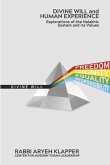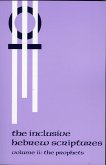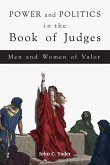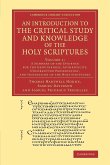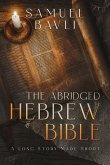- Broschiertes Buch
- Merkliste
- Auf die Merkliste
- Bewerten Bewerten
- Teilen
- Produkt teilen
- Produkterinnerung
- Produkterinnerung
This book addresses central theological issues and biblical narratives in terms of a bold thesis regarding relations between God and humans: that the actions of God and the actions of humans are informed by independently valid moral viewpoints which do not entirely overlap.
Andere Kunden interessierten sich auch für
![Divine Will and Human Experience: Explorations of the Halakhic System and Its Values Divine Will and Human Experience: Explorations of the Halakhic System and Its Values]() Rabbi Aryeh KlapperDivine Will and Human Experience: Explorations of the Halakhic System and Its Values16,99 €
Rabbi Aryeh KlapperDivine Will and Human Experience: Explorations of the Halakhic System and Its Values16,99 €![The Inclusive Hebrew Scriptures The Inclusive Hebrew Scriptures]() The Inclusive Hebrew Scriptures65,99 €
The Inclusive Hebrew Scriptures65,99 €![Contemporary Jewish Philosophy Contemporary Jewish Philosophy]() Irene KajonContemporary Jewish Philosophy65,99 €
Irene KajonContemporary Jewish Philosophy65,99 €![Power and Politics in the Book of Judges Power and Politics in the Book of Judges]() Power and Politics in the Book of Judges51,99 €
Power and Politics in the Book of Judges51,99 €![An Introduction to the Critical Study and Knowledge of the Holy Scriptures An Introduction to the Critical Study and Knowledge of the Holy Scriptures]() Thomas Hartwell HorneAn Introduction to the Critical Study and Knowledge of the Holy Scriptures65,99 €
Thomas Hartwell HorneAn Introduction to the Critical Study and Knowledge of the Holy Scriptures65,99 €![The Survivors of Israel The Survivors of Israel]() Mark Adam ElliottThe Survivors of Israel53,99 €
Mark Adam ElliottThe Survivors of Israel53,99 €![The Abridged Hebrew Bible The Abridged Hebrew Bible]() Samuel BavliThe Abridged Hebrew Bible18,99 €
Samuel BavliThe Abridged Hebrew Bible18,99 €-
-
-
This book addresses central theological issues and biblical narratives in terms of a bold thesis regarding relations between God and humans: that the actions of God and the actions of humans are informed by independently valid moral viewpoints which do not entirely overlap.
Hinweis: Dieser Artikel kann nur an eine deutsche Lieferadresse ausgeliefert werden.
Hinweis: Dieser Artikel kann nur an eine deutsche Lieferadresse ausgeliefert werden.
Produktdetails
- Produktdetails
- Verlag: Taylor & Francis
- Seitenzahl: 150
- Erscheinungstermin: 18. Dezember 2024
- Englisch
- Abmessung: 234mm x 156mm x 9mm
- Gewicht: 240g
- ISBN-13: 9781032539287
- ISBN-10: 1032539283
- Artikelnr.: 72105127
- Herstellerkennzeichnung
- Libri GmbH
- Europaallee 1
- 36244 Bad Hersfeld
- gpsr@libri.de
- Verlag: Taylor & Francis
- Seitenzahl: 150
- Erscheinungstermin: 18. Dezember 2024
- Englisch
- Abmessung: 234mm x 156mm x 9mm
- Gewicht: 240g
- ISBN-13: 9781032539287
- ISBN-10: 1032539283
- Artikelnr.: 72105127
- Herstellerkennzeichnung
- Libri GmbH
- Europaallee 1
- 36244 Bad Hersfeld
- gpsr@libri.de
Berel Dov Lerner received his PhD in philosophy from Tel Aviv University. He is an associate professor at Western Galilee College in Israel.
Introduction: About This Book and How to Read It
1. The Creator God and Humans in Cooperation and at Cross-purposes: the
Flood, Sodom, and Imitatio Dei
2. Human Participation in Divine Plans: Eden, Divine Punishment, and the
Betrothal of Rebekah
3. Responsible Rebels: Saul, Jonah, and Abraham Contend with God's Requests
4. God's Conversation with Satan is More Telling than His Answer from the
Whirlwind in the Book of Job
5. Nations as Moral Communities: Why Babel was Dispersed and Israel Created
6. The Covenant of the Pieces and its Epistemological Implications for
Biblical Historiography
7. Obscure Dreams and the Hiddenness of the Tetragrammaton Mark Divine
Manipulation and the Loss of Human Knowledge as the Patriarchs Give Way to
Joseph and his Brothers
8. Joseph the False Patriarch Executes Economic Policies which set the
Stage for the Israelites' Enslavement in Egypt
9. "Harsh Work": Israelite Enslavement and the Loss of Temporality and
Agency as Pharaoh's Failed Method of Population Control
10. The Paschal Sacrifice and the Sabbath Restore Israelite Temporality and
Agency
11. The Battle at Refidim and How the Miraculous Foundations of Moses'
Prophetic Authority Invited Idolatry and Required his Replacement by Joshua
12. Esther, Ruth, and Divine/Human Cooperation in a World Bereft of
Miracles
1. The Creator God and Humans in Cooperation and at Cross-purposes: the
Flood, Sodom, and Imitatio Dei
2. Human Participation in Divine Plans: Eden, Divine Punishment, and the
Betrothal of Rebekah
3. Responsible Rebels: Saul, Jonah, and Abraham Contend with God's Requests
4. God's Conversation with Satan is More Telling than His Answer from the
Whirlwind in the Book of Job
5. Nations as Moral Communities: Why Babel was Dispersed and Israel Created
6. The Covenant of the Pieces and its Epistemological Implications for
Biblical Historiography
7. Obscure Dreams and the Hiddenness of the Tetragrammaton Mark Divine
Manipulation and the Loss of Human Knowledge as the Patriarchs Give Way to
Joseph and his Brothers
8. Joseph the False Patriarch Executes Economic Policies which set the
Stage for the Israelites' Enslavement in Egypt
9. "Harsh Work": Israelite Enslavement and the Loss of Temporality and
Agency as Pharaoh's Failed Method of Population Control
10. The Paschal Sacrifice and the Sabbath Restore Israelite Temporality and
Agency
11. The Battle at Refidim and How the Miraculous Foundations of Moses'
Prophetic Authority Invited Idolatry and Required his Replacement by Joshua
12. Esther, Ruth, and Divine/Human Cooperation in a World Bereft of
Miracles
Introduction: About This Book and How to Read It
1. The Creator God and Humans in Cooperation and at Cross-purposes: the Flood, Sodom, and Imitatio Dei
2. Human Participation in Divine Plans: Eden, Divine Punishment, and the Betrothal of Rebekah
3. Responsible Rebels: Saul, Jonah, and Abraham Contend with God's Requests
4. God's Conversation with Satan is More Telling than His Answer from the Whirlwind in the Book of Job
5. Nations as Moral Communities: Why Babel was Dispersed and Israel Created
6. The Covenant of the Pieces and its Epistemological Implications for Biblical Historiography
7. Obscure Dreams and the Hiddenness of the Tetragrammaton Mark Divine Manipulation and the Loss of Human Knowledge as the Patriarchs Give Way to Joseph and his Brothers
8. Joseph the False Patriarch Executes Economic Policies which set the Stage for the Israelites' Enslavement in Egypt
9. "Harsh Work": Israelite Enslavement and the Loss of Temporality and Agency as Pharaoh's Failed Method of Population Control
10. The Paschal Sacrifice and the Sabbath Restore Israelite Temporality and Agency
11. The Battle at Refidim and How the Miraculous Foundations of Moses' Prophetic Authority Invited Idolatry and Required his Replacement by Joshua
12. Esther, Ruth, and Divine/Human Cooperation in a World Bereft of Miracles
1. The Creator God and Humans in Cooperation and at Cross-purposes: the Flood, Sodom, and Imitatio Dei
2. Human Participation in Divine Plans: Eden, Divine Punishment, and the Betrothal of Rebekah
3. Responsible Rebels: Saul, Jonah, and Abraham Contend with God's Requests
4. God's Conversation with Satan is More Telling than His Answer from the Whirlwind in the Book of Job
5. Nations as Moral Communities: Why Babel was Dispersed and Israel Created
6. The Covenant of the Pieces and its Epistemological Implications for Biblical Historiography
7. Obscure Dreams and the Hiddenness of the Tetragrammaton Mark Divine Manipulation and the Loss of Human Knowledge as the Patriarchs Give Way to Joseph and his Brothers
8. Joseph the False Patriarch Executes Economic Policies which set the Stage for the Israelites' Enslavement in Egypt
9. "Harsh Work": Israelite Enslavement and the Loss of Temporality and Agency as Pharaoh's Failed Method of Population Control
10. The Paschal Sacrifice and the Sabbath Restore Israelite Temporality and Agency
11. The Battle at Refidim and How the Miraculous Foundations of Moses' Prophetic Authority Invited Idolatry and Required his Replacement by Joshua
12. Esther, Ruth, and Divine/Human Cooperation in a World Bereft of Miracles
Introduction: About This Book and How to Read It
1. The Creator God and Humans in Cooperation and at Cross-purposes: the
Flood, Sodom, and Imitatio Dei
2. Human Participation in Divine Plans: Eden, Divine Punishment, and the
Betrothal of Rebekah
3. Responsible Rebels: Saul, Jonah, and Abraham Contend with God's Requests
4. God's Conversation with Satan is More Telling than His Answer from the
Whirlwind in the Book of Job
5. Nations as Moral Communities: Why Babel was Dispersed and Israel Created
6. The Covenant of the Pieces and its Epistemological Implications for
Biblical Historiography
7. Obscure Dreams and the Hiddenness of the Tetragrammaton Mark Divine
Manipulation and the Loss of Human Knowledge as the Patriarchs Give Way to
Joseph and his Brothers
8. Joseph the False Patriarch Executes Economic Policies which set the
Stage for the Israelites' Enslavement in Egypt
9. "Harsh Work": Israelite Enslavement and the Loss of Temporality and
Agency as Pharaoh's Failed Method of Population Control
10. The Paschal Sacrifice and the Sabbath Restore Israelite Temporality and
Agency
11. The Battle at Refidim and How the Miraculous Foundations of Moses'
Prophetic Authority Invited Idolatry and Required his Replacement by Joshua
12. Esther, Ruth, and Divine/Human Cooperation in a World Bereft of
Miracles
1. The Creator God and Humans in Cooperation and at Cross-purposes: the
Flood, Sodom, and Imitatio Dei
2. Human Participation in Divine Plans: Eden, Divine Punishment, and the
Betrothal of Rebekah
3. Responsible Rebels: Saul, Jonah, and Abraham Contend with God's Requests
4. God's Conversation with Satan is More Telling than His Answer from the
Whirlwind in the Book of Job
5. Nations as Moral Communities: Why Babel was Dispersed and Israel Created
6. The Covenant of the Pieces and its Epistemological Implications for
Biblical Historiography
7. Obscure Dreams and the Hiddenness of the Tetragrammaton Mark Divine
Manipulation and the Loss of Human Knowledge as the Patriarchs Give Way to
Joseph and his Brothers
8. Joseph the False Patriarch Executes Economic Policies which set the
Stage for the Israelites' Enslavement in Egypt
9. "Harsh Work": Israelite Enslavement and the Loss of Temporality and
Agency as Pharaoh's Failed Method of Population Control
10. The Paschal Sacrifice and the Sabbath Restore Israelite Temporality and
Agency
11. The Battle at Refidim and How the Miraculous Foundations of Moses'
Prophetic Authority Invited Idolatry and Required his Replacement by Joshua
12. Esther, Ruth, and Divine/Human Cooperation in a World Bereft of
Miracles
Introduction: About This Book and How to Read It
1. The Creator God and Humans in Cooperation and at Cross-purposes: the Flood, Sodom, and Imitatio Dei
2. Human Participation in Divine Plans: Eden, Divine Punishment, and the Betrothal of Rebekah
3. Responsible Rebels: Saul, Jonah, and Abraham Contend with God's Requests
4. God's Conversation with Satan is More Telling than His Answer from the Whirlwind in the Book of Job
5. Nations as Moral Communities: Why Babel was Dispersed and Israel Created
6. The Covenant of the Pieces and its Epistemological Implications for Biblical Historiography
7. Obscure Dreams and the Hiddenness of the Tetragrammaton Mark Divine Manipulation and the Loss of Human Knowledge as the Patriarchs Give Way to Joseph and his Brothers
8. Joseph the False Patriarch Executes Economic Policies which set the Stage for the Israelites' Enslavement in Egypt
9. "Harsh Work": Israelite Enslavement and the Loss of Temporality and Agency as Pharaoh's Failed Method of Population Control
10. The Paschal Sacrifice and the Sabbath Restore Israelite Temporality and Agency
11. The Battle at Refidim and How the Miraculous Foundations of Moses' Prophetic Authority Invited Idolatry and Required his Replacement by Joshua
12. Esther, Ruth, and Divine/Human Cooperation in a World Bereft of Miracles
1. The Creator God and Humans in Cooperation and at Cross-purposes: the Flood, Sodom, and Imitatio Dei
2. Human Participation in Divine Plans: Eden, Divine Punishment, and the Betrothal of Rebekah
3. Responsible Rebels: Saul, Jonah, and Abraham Contend with God's Requests
4. God's Conversation with Satan is More Telling than His Answer from the Whirlwind in the Book of Job
5. Nations as Moral Communities: Why Babel was Dispersed and Israel Created
6. The Covenant of the Pieces and its Epistemological Implications for Biblical Historiography
7. Obscure Dreams and the Hiddenness of the Tetragrammaton Mark Divine Manipulation and the Loss of Human Knowledge as the Patriarchs Give Way to Joseph and his Brothers
8. Joseph the False Patriarch Executes Economic Policies which set the Stage for the Israelites' Enslavement in Egypt
9. "Harsh Work": Israelite Enslavement and the Loss of Temporality and Agency as Pharaoh's Failed Method of Population Control
10. The Paschal Sacrifice and the Sabbath Restore Israelite Temporality and Agency
11. The Battle at Refidim and How the Miraculous Foundations of Moses' Prophetic Authority Invited Idolatry and Required his Replacement by Joshua
12. Esther, Ruth, and Divine/Human Cooperation in a World Bereft of Miracles


